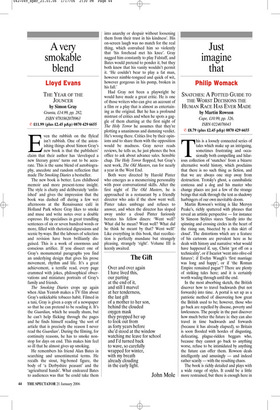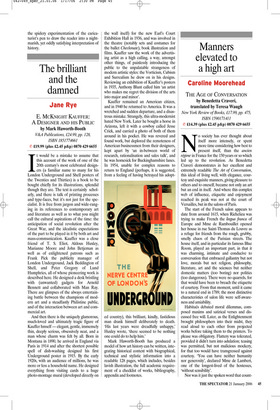Just imagine that
Philip Womack
SNATCHES: A POTTED GUIDE TO THE WORST DECISIONS THE HUMAN RACE HAS EVER MADE by Martin Rowson Cape, £10.99, pp. 326, ISBN 0224076043 ✆ £8.79 (plus £2.45 p&p) 0870 429 6655 This is a loosely connected series of tales which make up an intriguing, sometimes frustrating and occasionally both compelling and hilarious collection of ‘snatches’ from a bizarre alternative world history, which proclaims that there is no such thing as fiction, and that we are always one step away from destruction. Trotsky’s ghost, a cannibalistic contessa and a dog and his master who change places are just a few of the strange beings that stalk through the text as shadowy harbingers of our own inevitable doom.
Martin Rowson’s writing is like Mervyn Peake’s, richly spattered with phrases that reveal an artistic perspective — for instance St Simeon Stylites stares ‘fixedly into the spinning and crossing circles in the heart of the rising sun, bisected by a thin skirt of cloud’. The distortions which are a feature of his cartoons are prevalent here as he deals with history and narrative: what would have happened if, say, Christ ‘got off on a technicality’, or if Iscariot ‘went into olive-oil futures’; if Evelyn Waugh’s ‘first marriage was long and happy’, or if ‘the Roman Empire remained pagan’? There are plenty of striking tales here; and it is certainly worth wading through until the end.
In the most absorbing sketch, the British discover how to travel backwards (but not forwards) into time. A portal is set up as a patriotic method of discovering how great the British used to be; however, those who go back are repelled by disease, poverty and lawlessness. The people in the past discover how much better the future is: they can also travel in time backwards and forwards (because it has already elapsed), so Britain is soon flooded with hordes of disgusting, defecating, plague-ridden beggars who, because they cannot go back to anything worse, refuse to be intimidated by anything the future can offer them. Rowson deals intelligently and amusingly — and indeed rather scarily — with the resulting chaos.
The book is richly detailed and plays with a wide range of styles. It could be a little more restrained, but there is enough here in the spidery experimentation of the caricaturist’s pen to draw the reader into a nightmarish, yet oddly satisfying interpretation of history.




















































 Previous page
Previous page